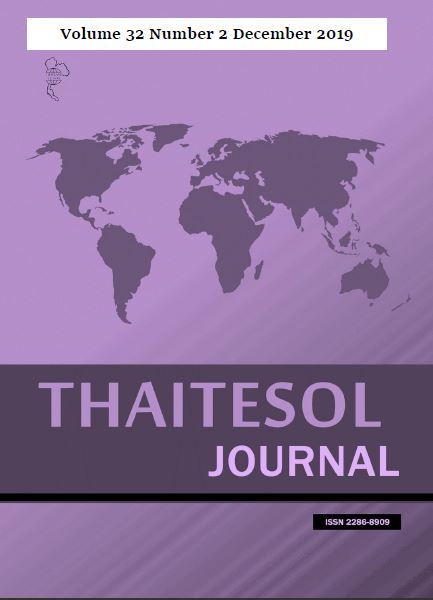The Development of a Localized ELT Textbook Evaluation Checklist: A Case Study from Thailand
Main Article Content
Abstract
In language teaching and learning, a textbook is one of the key resources/materials that helps language teachers and learners to achieve particular teaching and learning outcomes. Evaluating a textbook using an appropriate evaluation checklist will assist teachers in choosing the most suitable textbook for their students. This paper, therefore, presents a new textbook evaluation checklist specifically developed for English language education in the context of Thailand. This localized textbook evaluation checklist was partly revised from some existing textbook evaluation checklists (e.g. Ahmed, 2016; Böcü & Razi, 2016; Hamidi et al, 2016; Harbi, 2017; Khoo & Knight, 2015; Laabidi & Nfissi, 2016; Litz, 2005). The newly localized checklist, consisting of eight different evaluation categories (70 items in total), is found useful as a systematic guideline for textbook evaluation at all stages, i.e. pre-use evaluation, in-use evaluation, and post-use evaluation. Hence, teachers can prepare additional teaching materials for their students to achieve the learning objectives.
Article Details
Materials in THAITESOL JOURNAL may be photocopied for educational purposes. Under no circumstances may any part of this journal be photocopied for commercial purposes.
References
Language and Literary Studies, 7(3), 57-70. doi: 10.7575/aiac.alls.v.7n.3p.57
Alosaimi, M. N (2013). Evaluating KSA Primary State English Language Course in the
Lights of Active Learning principles, (Master’s thesis, Taif University: Saudi Arabi. Retrieved from http://search.mandumah.com /Record/653336.
Al-Qazaq, M. B. (2011). An Evaluation of the Action Pack Textbook Series for the
Jordanian Upper Basic Stage Students in Light of Lifelong Learning and Basic Academic
Competencies and the English Teachers’ Views, (Master’s thesis, Amman University:
Jordan).
Alshehri, A. A. (2012). An evaluation of EFL textbooks used for teaching in Saudi
intermediate schools. College of Education Journal, 147(1), 849-892.
Al-Thubaiti, L. K. (2013). Evaluating Activities of KSA Intermediate English Language
Course in the Lights of the Principles of Learner-Centered Instruction, (Master’s thesis,
Taif University: Saudi Arabia).
Böcü, A. B. & Razi, S. (2016). Evaluation of textbook series ‘Life” in terms of cultural
components. Journal of Language and Linguistic Studies, 12(2), 221-237.
Byrd, P. & Schuemann, C. (2014). English as a second/foreign language textbooks: How to
choose them how to use them. In M. Celce-Murcia, D. Brinton & M.A. Snow (Eds.),
Teaching English as a second or foreign language (pp. 380-393). Boston: National
Geographic Learning.
Cunningsworth, A. (1995). Choosing Your Coursebook. Oxford: Heinemann.
Daoud, A. & Celce-Murcia, M. (1979). Selecting and evaluating a textbook. In M. Celce-
Murcia & L. McIntosh (Eds.), Teaching English as a Second or Foreign Language
(pp. 302-307). Cambridge, MA: Newbury House Publishers.
Dweikat, K. A. (2011). Investigating teachers’ and students’ attitudes towards the activities
and exercises of EFL textbook for tenth grade in Palestine. Journal of Al-Quds Open
University for Research and Studies, 23(1), 27-79.
Ellis, R. (1997). The empirical evaluation of language teaching materials. ELT Journal,
51(1), 36-42. doi: 10.1093/elt/51.1.36.
Gutiérrez Bermúdez, J. F. (2014). An exercise in course-book evaluation: Strengths,
weaknesses, and recommendations regarding New English File: Elementary. Latin
American Journal of Content and Language Integrated Learning, 7(1), 98-111.
doi: 10.5294/laclil.2014.7.1.6
Hamidi, H., Bagheri, M., Sarinavaee, M., & Seyyedpour, A. (2016). Evaluation of two
general English textbooks: New Interchange 2 vs. Four Corners 3. Journal of Language
Teaching and Research, 7(2), 345-351. doi: 10.17507/jltr.0702.13
Harbi, A. A. (2017). Evaluation study for secondary stage EFL textbook: EFL teachers’
perspectives. English Language Teaching, 10(3), 26-39. doi: 10.5539/elt.v10n3p26
Khodabakhshi, M. (2014). Choose a proper EFL textbook: Evaluation of “Skyline”
series. Procedia – Social and Behavioral Sciences, 98, 959-967.
doi:10.1016/j.sbspro.2014.03.505
Khoo, H. S., & Knight, P. (2015). Teachers’ evaluation of KBSM Form 4, 5 English
textbooks used in the secondary schools in Penang, Malaysia. Advances in Language and
Literary Studies, 6(4), 128-150. doi: 10.7575/aiac.alls.v.6n.4p.128
Laabidi, H., & Nfissi, A. (2016). Fundamental criteria for effective textbook evaluation. EFL
Journal, 1(2), 141-159. doi: 10.21462/eflj.v1i2.13
Litz, D.R.A. (2005). Textbook evaluation and ELT management: A South Korean Case
Study. Asian EFL Journal, 48(1), 1-53.
Ministry of Education. (2014). Notification on English Language Education Reform Policy.
Retrieved November 15, 2017, from http://english.obec.go.th/english/2013/index.php/th/
2012-08-08-10-26-5/60-2014-04-05-08-29-13 (in Thai)
Office of Basic Education Commission. (2015). Handbook of New National English
Language Teaching Aligned with the Common European Framework of Reference for
Languages (CEFR). Bangkok, Thailand: The War Veterans Organization of Thailand
Printing House.
Phonhan, P., Praphan, P. W., & Chaiyasuk, I. (2012). An evaluation of My World textbooks
regarding the EFL teachers’ perceptions and classroom applications: A Case study of
Thai teachers. RMUJ (Humanities and Social Sciences), 6(2), 17-27.
Riazi, A.M. (2003). What textbook evaluation schemes tell us? A study of the textbook
evaluation schemes of three decades. In W.A. Renandya. (Ed.), Methodology and
Materials Design in Language Teaching (pp. 52-68). Singapore: SEAMEO Regional
Center.
Sheldon, L.E. (1988). Evaluating ELT textbooks and materials. ELT Journal, 42(4), 237-
246.
Srakang, L. & Jansem, A. (2013). A study of teachers’ perceptions toward using English
textbooks: A case study of 10th grade English teachers in Maha Sarakham province. FLLT
Conference Proceedings, 2(1), 49-58.
Tomlinson, B. (2012). Materials development for language learning & teaching. Language
Teaching, 45(2), 143-179.
Ur, P. (2012). A course in language teaching: Practice and theory. Cambridge: Cambridge
University Press.
Wongkaew, A. (2009). An Analysis of Teachers’ Textbook Use Behaviors and the Effects on
Students’ Behavior: Mixed Method Research. (Unpublished master’s thesis)
Chulalongkorn University, Bangkok.


